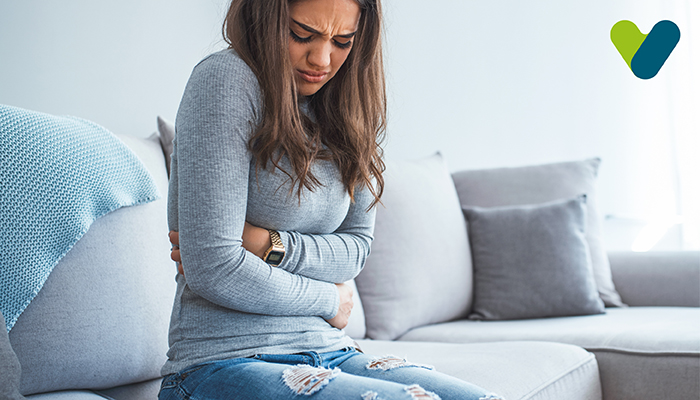Pregnancy is a period when a woman's body experiences tremendous changes and also comes under tremendous strain. A lot of the changes that take place in your body, in fact, prepare your body for the immense strain that it will undergo in the months to come. The body prepares itself, so that you can deliver your baby without a hitch.
Becoming aware of the changes that your body will go through, the sensations, aches, pains and patterns to come, will help you be better prepared and avoid confusion. In this women's health post we will talk about two of the first things you are likely to experience: cramps or stomach pain during pregnancy and about back pain in early pregnancy.
Reasons for cramps and backache during pregnancy
Before you jump to conclusions and assume that you are having complications in early pregnancy, consider these other potential causes of pelvic pains during pregnancy and back pain in early pregnancy.Part of the process:
After the egg is fertilized, it attaches itself to the uterine lining. This process - known as implantation - can result in cramps, and even spotting, though not all women experience these symptoms. This is what one might call a "1 week pregnant stomach pain".As you can imagine, this kind of pain in pregnancy is no cause for worry and is in fact proof that things are progressing as they should.
Over-flexibility in muscles:
Hormones like progesterone and relaxin, see a spike in secretion when you are pregnant. The idea is to enable the ligaments to ease up in preparation for labour (which is admittedly a long time away).While these hormones are essential to a normal and healthy delivery, they do also result in joint pain. Everyday activities can easily injure you when such hormones make your muscles overly flexible in a bid to help you expand the birth canal during delivery. That's why they tell pregnant women to take it easy.
Expanding uterus
During pregnancy, the uterus expands to make room for the growing foetus. This puts strain on the woman's back, and is one of the commonest reasons for back pain during pregnancy, alongside a change in posture due to expansion of the abdomen or feeling off kilter.At the end of the trimester, fairly painful cramping might occur as the uterus expands greatly, stretching the tissue that connects it to the abdomen and the pelvis. Something like a stretched rubber band. Ouch.
Later in pregnancy, the weight of the uterus puts additional strain on the woman's pack, but in early pregnancy, back pain is most often due to changes in posture linked to a growing belly.
It's just gas
The unpleasant truth is that constipation and gas are the norm rather than the exception during pregnancy. That horrible cramping you feel could just be constipation and/or gas.That said, if you experience cramping and bleeding at the same time it could be a cause for alarm. Some reasons for cramping and bleeding early in the pregnancy could be:
Miscarriage or preterm birth, where the woman will experience the feelings of labour very early in the pregnancy. One might experience contractions - or pains - that last nearly a minute, go away and then come back in regular intervals.
Ectopic pregnancy, where the egg is fertilized and becomes attached outside the uterus, like perhaps in the fallopian tubes. The woman will usually also experience dizziness. The ectopic pregnancy has to be terminated as soon as it is discovered as it cannot be carried to term anyway and is life-threatening to the mother.
Any bleeding accompanied by cramping should be reported to the appointed obstetrician. This is why it is important to locate and appoint an obstetrician as soon as you are pregnant and to ensure that the obstetrician is within reach.
How to minimize pain from cramping and back strain during pregnancy
# Watch your posture. Avoid leaning back. Try to maintain a straight posture even as your abdomen expands. Similarly, get used to not seeing your feet while you walk - avoid leaning forward.Similarly watch your posture when you are sitting down, too.
# Consider your mattress, and when your belly expands, experiment with pillows and cushions tucked under your belly, between the knees etc. to get comfortable and get adequate support when you are lying down.
# Eat a healthy diet with plenty of fruits and vegetables - 5 portions - to minimize pain arising from gas and constipation.
# Avoid lifting heavy objects. Remember what we said about over flexible muscles that feel no strain, but get injured easily
# If you must carry a heavy handbag, or heavy shopping bags (or your laptop, handbag and tiffin bag) then try to distribute weight evenly on both sides.
# Turn your whole body, feet up or just turn your head when you turn to look at something or speak to someone and so on, to avoid twisting your spine.
# Wear flat, comfortable, sturdy shoes.
# Rest sufficiently.
# Pamper yourself with a massage or a nice, steamy bath.
# Use a heating pad, in consultation with your obstetrician.
# Exercise, but keep it mild. Swap the gym member for pool membership (but maybe that's not an option amidst the pandemic). Consider yoga and pilates or keep it simple and go for a brisk walk. Also learn and practice pelvic floor strengthening exercises.


